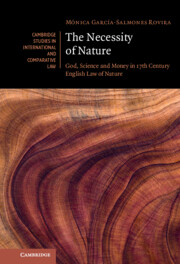
- Publisher:
- Cambridge University Press
- Online publication date:
- February 2023
- Print publication year:
- 2023
- Online ISBN:
- 9781009332149
Our systems are now restored following recent technical disruption, and we’re working hard to catch up on publishing. We apologise for the inconvenience caused. Find out more: https://www.cambridge.org/universitypress/about-us/news-and-blogs/cambridge-university-press-publishing-update-following-technical-disruption

To understand our current world crises, it is essential to study the origins of the systems and institutions we now take for granted. This book takes a novel approach to charting intellectual, scientific and philosophical histories alongside the development of the international legal order by studying the philosophy and theology of the Scientific Revolution and its impact on European natural law, political liberalism and political economy. Starting from analysis of the work of Thomas Hobbes, Robert Boyle and John Locke on natural law, the author incorporates a holistic approach that encompasses global legal matters beyond the foundational matters of treaties and diplomacy. The monograph promotes a sustainable transformation of international law in the context of related philosophy, history and theology. Tackling issues such as nature, money, necessities, human nature, secularism and epistemology, which underlie natural lawyers' thinking, Associate Professor García-Salmones explains their enduring relevance for international legal studies today.
‘This book contributes innovatively and originally to clarifying the complexity of the debates on natural law in the 17th century, showing how we might stand to benefit from them in the present day.’
Gustavo Gozzi Source: Journal of the History of International Law
 Loading metrics...
Loading metrics...
* Views captured on Cambridge Core between #date#. This data will be updated every 24 hours.
Usage data cannot currently be displayed.